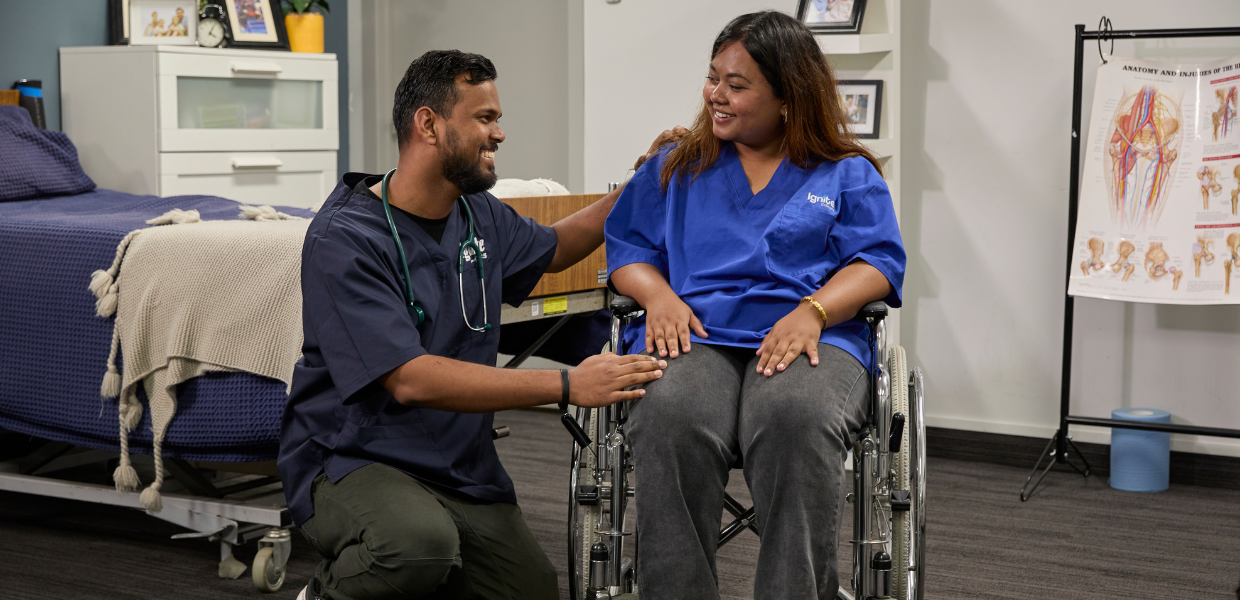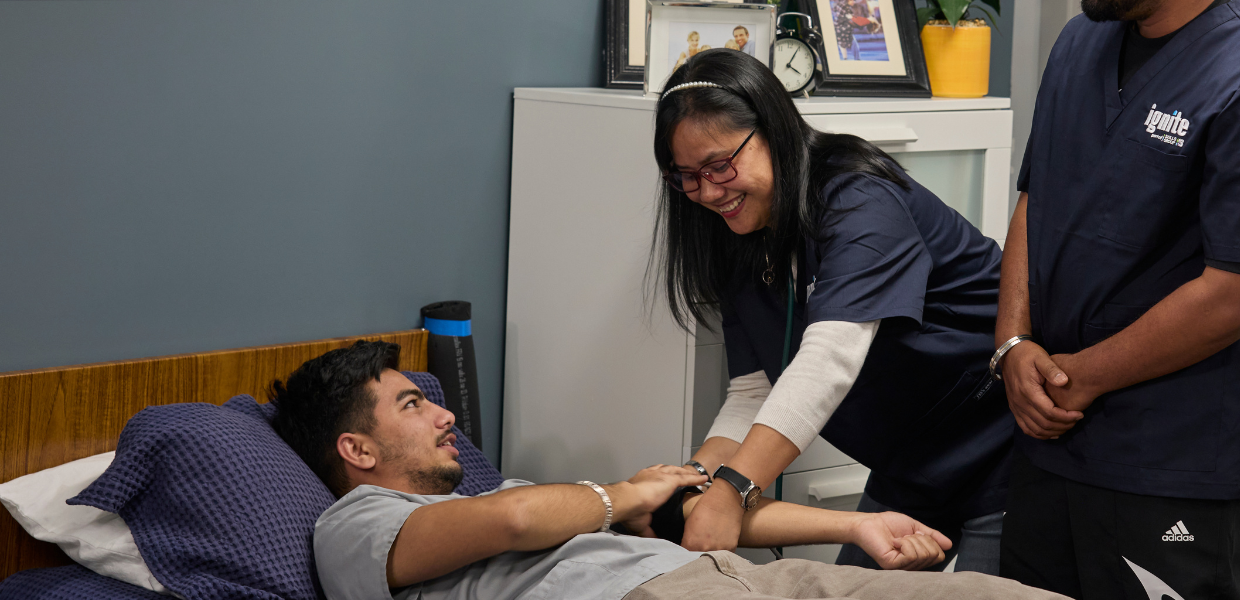Health and Wellbeing
Gain the entry level skills and knowledge required to provide person centred support in health and wellbeing industry
Gain the entry level skills and knowledge required to provide person centred support in health and wellbeing sectors. This is online programme is also an entry pathway into careers in the health and mode being sectors. Graduates will benefit by gaining recognition of the transferrable skills and knowledge valued in the health and wellbeing sectors which allow you to grow in your career.
Who can enrol?
If you are 16 years or older and already working in the healthcare sector, this course is the perfect first step.
What will I learn?
In this programme you will learn about:
- Introduction to support work
- Person centred care
- Health & Safety, and well-being
- Infection control
- Assisted eating and drinking
- Communication skills
- Planning care plans
- Basic Tikanga and cultural practices
- Relevant legislation and codes, policies and procedure.
What quals will I gain?
New Zealand Certificate in Health and Wellbeing (Level 2) – Toitu te Waiora Community, Health, Education and Social Services Workforce Development Council

Ready to Enrol?
- Download and complete the Enrolment Form
- Provide a certified copy of your New Zealand or Australian passport, or your birth certificate
- Email the completed documents to [email protected]

Where will this take me?
Enhance your career opportunities by progressing to our Level 3 programme. Either way you’ll stand out from the crowd by having trained at Skills Ignite!
Does the course include work experience?
Yes! 80 hours of the course is spent on a clinical placement at an aged care or disability facility.
How much does this course cost?
This programme is free. Please speak to our Student Services Team (0800 200 345) to find out how to enrol.
How long will it take me to complete?
The distance learning course is 20 weeks and the face to face course is 14 weeks at Skills Ignite.
I’ve never done online distance learning before and worry about not having classmates to talk to. Can I speak to my tutor or other students?
Yes, there are online discussions involving other students in your class. You will be able to speak to your tutor on the phone and contact your tutor by email. You can also drop into Skills Ignite to meet with your tutor.
If I do online distance study and am working shifts, will I miss any of the content?
You will have online access to all content, so you will not miss content due to your work hours. Instead you can study at times that suit your schedule.
How many credits will I receive?
The New Zealand Certificate in Health and Wellbeing Level 2 is NZQA-approved and worth 40 credits.
Is this qualification recognised for pay equity in the health sector?
Yes, it is.
Do I need to be employed in the Health and Wellbeing sector to do this distance programme?
You need to be employed to do this through distance study, your employer will need to fill out a simple form as part of the enrolment process. You don’t have to be employed if you enrol on the face-to-face programme.
Will I be able to manage my time?
Please speak to the Student Services Team on 0800 200 345 to discuss how to manage your time and balance study with your other commitments.
What devices and access do I need?
You need to have the below only if you want to study this course through online distance:
- a mobile phone
- access to a computer or a laptop
- a Gmail address
- access to the internet
- access to Whatsapp
Do I need to have computer skills?
You need the below to study online through distance learning:
- Basic computer and internet skills to participate effectively in this course
- Be able to undertake basic searches using Google, YouTube or others
- Know how to use Microsoft Word to complete assignments
Healthcare workers provide assistance, support and care to people in need (such as the aged or disabled) in a wide range of health, welfare, residential and community settings. The work they do fills a crucial role in society and is becoming even more critical as New Zealand’s population becomes increasingly older.
By 2021, 34,547 people are estimated to be working as personal carers and assistants in New Zealand – that’s up 0.9 percent from 2013. Employment in the sector is expected to remain stable out to 2026. According to a 2015 Ministry of Health survey, healthcare support workers are predominantly female (91 percent) and have an older age profile than other New Zealand workforces, with 54 percent of workers aged between 45 and 64. In addition, the survey found most support workers were employed part-time, working an average of 21 hours a week. Late nights, early mornings, weekend and shift work is common.
What makes a great healthcare worker?
Most people enter the healthcare sector because they are passionate about helping others and dedicated to making a meaningful difference in their communities. Having empathy and a kind and caring nature is a must. But there are several other skills and traits that help to make an exceptional healthcare worker. These include:
- good customer service skills
- first-aid knowledge
- knowledge of health and safety standards
- patient, tolerant and compassionate
- practical
- organised and responsible
- skilled at listening and communicating
- able to relate well to people from a range of cultures
- able to follow instructions
- fit, healthy, strong and free of back problems
Employment opportunities
Employment opportunities for healthcare support workers are good, thanks primarily to New Zealand’s aging population, and the increasing demand this is putting on our healthcare services. And while many care workers are employed in hospitals and nursing homes, there are also excellent opportunities in private home care companies, specialist care providers, church and welfare-based trusts, and home support services run by District Health Boards (DHBs).
In 2017, pay equity in the sector took a giant leap forward, with the passing of the Care and Support Worker (Pay Equity) Settlement Act, which removed wage discrimination based on gender for 55,000 care and support workers – and led to pay rises of 15-50 percent. Linking pay rates to qualifications, the Act encourages workers to increase their qualifications, and helps New Zealand build a more highly training workforce.
The new wage rates are being rolled out over five years and as of July 2018, healthcare support workers with a Level 2 qualification earn $23/hour (the same as an unqualified person who has been working in the sector for three years); those with a Level 3 qualification start on $25/hour (the equivalent of someone who’s been working for eight years); and a Level 4 qualification starts you on $27/hour, the same as an unqualified worker who has been in the sector for 12 years.
Entry-level roles in the health sector include:
- caregiver
- healthcare assistant
- home care support worker
- hospital orderly
- nurse aide
- nursing support and care worker
- personal care assistant
- Once in the industry, there are plenty of opportunities for progression and specialisation. Go onto degree-level studies and become a registered nurse, become a health promoter in the local community or within a government agency, or move into an administrative or managerial role in a hospital or private healthcare organisation.
Sources: Careers.govt.nz, Ministry of Health – Manatū Hauora

